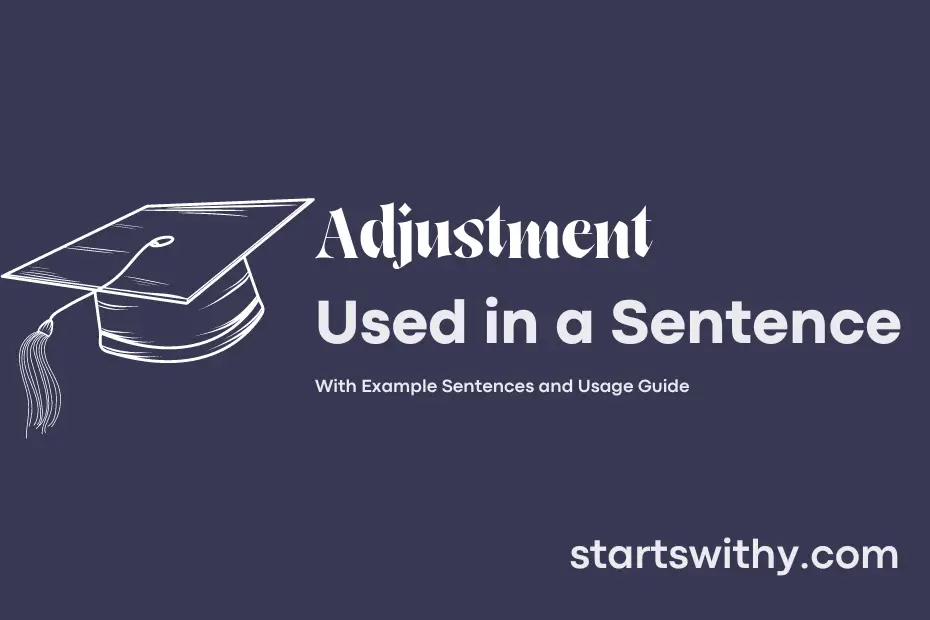Are you familiar with the term “adjustment”? This word refers to the act of making small changes or modifications to achieve a better fit or result in a particular situation.
In everyday life, adjustments are commonly made in various scenarios such as fine-tuning a recipe, tweaking a budget, or calibrating a machine. It’s all about finding the right balance and making necessary modifications to improve outcomes.
7 Examples Of Adjustment Used In a Sentence For Kids
- Adjustment means changing to fit in a new situation.
- We can make an adjustment to our chair so we can sit comfortably.
- Let’s make an adjustment to our masks to cover our noses and mouths.
- I made an adjustment to my clothes because it was too tight.
- We need to make an adjustment to our volume so it’s not too loud.
- Let’s practice making an adjustment to our sentence so it makes sense.
- Remember to make an adjustment to your behavior to be kind to others.

14 Sentences with Adjustment Examples
- Students may need to make adjustments in their study schedules to accommodate extracurricular activities.
- The first few weeks of college can be challenging as students make adjustments to living away from home.
- Learning how to budget effectively is an important adjustment for college students.
- Balancing social life and academics requires constant adjustment for college students.
- Making adjustments to new subjects and teaching styles can be difficult for students transitioning to college.
- College students often need to make adjustments in their diet and exercise routines to maintain a healthy lifestyle.
- Time management skills are crucial for college students as they navigate the adjustments in their schedules.
- The transition from high school to college can be overwhelming, but students will eventually make adjustments and find their rhythm.
- Understanding the importance of mental health and seeking help when needed is a valuable adjustment for college students.
- Many college students experience financial challenges and need to make adjustments to their spending habits.
- Learning how to navigate group projects and working with diverse personalities is an important adjustment for college students.
- Making adjustments to living in a dormitory with roommates can be a learning experience for college students.
- The pressure to excel academically can lead to stress, requiring students to make adjustments to prioritize their mental well-being.
- Recognizing the need for self-care and making the necessary adjustments is essential for college students to avoid burnout.

How To Use Adjustment in Sentences?
When adjustment is used in a sentence, it means making a change or alteration to something in order to improve or fit better. To use adjustment effectively in a sentence, you can start by identifying what needs to be changed or adapted. For example, “I made a few adjustments to the recipe to suit my taste.” This sentence shows that the recipe was modified to make it more suitable.
Next, you can add details about why the adjustment was necessary or what impact it had. For instance, “After making some adjustments to my study schedule, I was able to improve my grades.” Here, the sentence explains how changing the study schedule led to better academic performance.

Remember that adjustment can refer to a wide range of changes, from small tweaks to major modifications. It is important to be clear and specific in your sentence to ensure that the meaning is understood. Practice using adjustment in different contexts to become more comfortable with incorporating it into your writing. Overall, using adjustment in a sentence is a great way to convey the idea of making changes for improvement or suitability.
Conclusion
In conclusion, sentences with the term “adjustment” reflect alterations or modifications made to achieve balance or improve a particular situation. These adjustments can pertain to various aspects of life, such as finances, schedules, or strategies, and are essential for adapting to changing circumstances. By making necessary adjustments, individuals can effectively navigate challenges, enhance outcomes, and maintain equilibrium in their daily activities.
Whether it’s adjusting a budget to save money, tweaking a work schedule for better productivity, or fine-tuning a plan to meet a goal, being open to making adjustments is key to progress and success. Embracing flexibility and being willing to modify strategies as needed can lead to more efficient problem-solving and ultimately contribute to overall growth and improvement in different areas of life.



